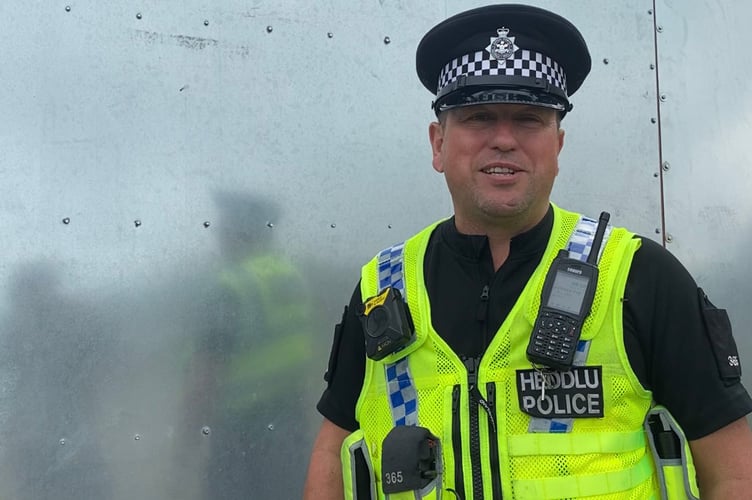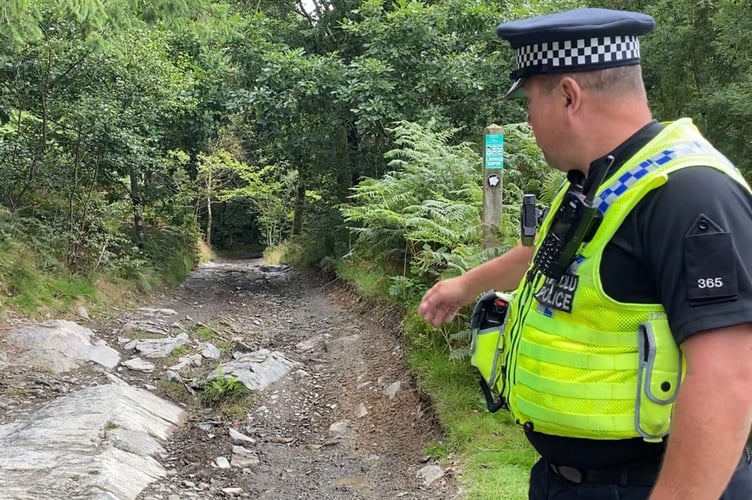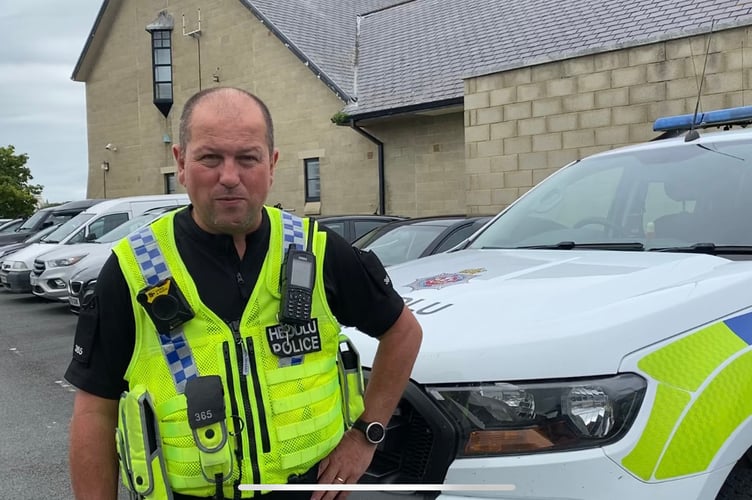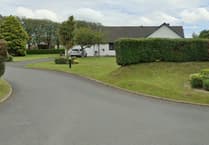Every day is different, and the officers working on the specialised Rural Crime Unit of Dyfed-Powys Police never quite know what they’ll be dealing with as they cover one of the largest rural patches of any force across the UK.
The Dyfed Powys Police Rural crime unit covers all four divisions within the force area. Each division is Policed by a dedicated Police officer and a Police Community support Officer who are both trained and specialise with rural affairs.

There are specific offences that predominantly occur within the countryside, affecting farming and more populated communities, or our wildlife, habitats and heritage.
It takes a special kind of officer to be able to fight crime in the countryside – coppers who are outstanding in their field. Literally.
The force, which covers Pembrokeshire, Carmarthenshire, Powys and Ceredigion – pretty much half of Wales territory-wise – set up the unit five years ago to combat crime. Where there’s farm equipment and few people, criminals see opportunity – and the Rural Crime Unit is out to get the bad guys and offer support to the farming community and rural residents.
The job sees Rural Crime officers tackling crime in the most remote parts of wild Wales, from remote farms, to large forests, coastal areas and open hills. But what does a day in the life of a rural crime officer look like?
The Cambrian News followed Ceredigion Rural Crime Officer PC Jonathan Thomas for a day to see what a day can bring. He’s a 20-year veteran on Dyfed-Powys Police. He’s lived in and around Aberystwyth his whole life, he comes from a farming background and has an interest in the ‘rural life’ - natural knowledge that helps him carry out his duty. Police Community Support Officer Eleri Morgan is also a member of Ceredigion rural crime team and she is based in Lampeter.
“Dyfed-Powys Police cover one of the largest geographical areas throughout the UK, a lot of that area is rural.”
He was inspired to join the Police force by his father-in-law, who served Dyfed-Powys police for 30 years.
He followed his father-in-law’s footsteps in 2004 when he joined Dyfed-Powys to work in their custody department, and became an officer in 2009. He spent five years working as an officer in Aberystwyth, and then nine years in Machynlleth before he became a member of the Rural Crime Team in 2022.
The unit works similar hours to regular officers, eight-hour shifts in the week, and 10-hour shifts on the weekends. But ‘Jono’, a most people know him, explained the system wasn’t as simple as that. He said: “Sometimes the call can come in at the end of your shift, whether that’s late at night or early in the morning, but you’ve got to take it.”
Despite the similar shift patterns, a typical Rural crime Police officer will complete the National wildlife Crime course which explains the laws and nuances of rural crime. Rural Crime officers also complete a 4x4 off roading course. The course teaches officers how to travel up and down steep hills, and makes them aware of the impact that different terrain can have on the vehicle as well as what the vehicle is capable of in different situations, terrains and times of the year.

“Being a rural crime officer is a specialised role. You wouldn’t expect the average Police officer to be able to carry out the role. For one thing, you need to know the specifics of the law surrounding rural crimes.”
The day of a Rural Crime officer can vary, especially in Mid Wales. Officers can find themselves herding cows off the highway, running operations in remote areas, tracking off sea drug drops or assisting regular response officers in local towns. PC Thomas said: “Working where we live, you can find yourself dealing with a matter in an extremely remote location one minute then dealing with an incident in the town after.
To carry out their duties, rural crime officers work closely with partner agencies such as Local authority and Natural Resources Wales, as well as members of the public living off the beaten path.
The Dyfed Powys Rural crime team regularly get together and work closely as a bigger team. They are regularly out and about participating in multi agency operations across the force area tackling ongoing issues in a particular area.
The team also work closely, alongside other neighbouring forces across England and Wales. They will assist with tackling any ongoing issues by conducting cross border patrols at night.
One key advantage for PC Thomas in gathering information is his ability to speak Welsh, which is more commonly spoken in rural areas of Ceredigion and Powys. This allows him to properly understand the situations he is tasked with investigating and have the best communication with key people, in of the largest geographical areas, having access to that information is key to putting an end to crime in some of the most rural areas, where criminals have many exits, escapes and other ways to get away with illegal activities.
Also helping him carry out his duty is his 4x4 Ford Ranger, which allows him to access the remote areas he operates in - even places inaccessible to other vehicles.
“The car allows rural crime officers to get to inaccessible places, especially in the winter. The car can help response officers too when they need to get somewhere their vehicles couldn’t reach.”
PC Thomas said the situations the team face change with the seasons, instances of illegal off roading are more common in the summer, and illegal hunting across the winter. But some crimes occur all year round - mainly, livestock worrying and thefts from farms.
Livestock worrying occurs when a dog attacks or chases livestock, causing them injury or harm. In cases, dog attacks will kill livestock.

Instances of livestock worrying have increased by 50 per cent between 2019 and 2022 according to NFU Mutual.
The cost of damage has increased too, jumping from £1.2 million to £1.8 million.
Despite instances of the offence growing across the UK, the crime can go unreported. But according to PC Thomas, all instances should be reported.
He said: “Farmers may leave issues of livestock worrying unreported if there was no harm caused, but I would advise and urge every instance be reported to us. The more data we have on instances of livestock worrying, the better we can deal with them.”
The Cambrian News visited the victim of the “worst livestock worrying incident” PC Thomas had ever seen.
The case was still under investigation, so details of the incident can’t be shared. Despite that, the victim spoke anonymously. They said: “We poured everything into our farm, it was our big dream. It took so many years of work. It impacted us financially, but it impacted us mentally too. When I saw the devastation, it left a mark. I still haven’t gone to the field where the incident occurred.”
When investigating instances of livestock worrying it can be extremely difficult to achieve best evidence. Ideally, the Police need to match a dog’s DNA with the DNA they find on the scene. But without strong grounds to obtain a search warrant, police cannot force themselves onto private property and take samples from dogs they suspect to be involved.
There isn’t a database which keeps track of dogs that have committed the offence in the past, this is different from people who commit crimes, whose DNA will be stored in a database and can be used to connect or rule out their involvement in future crimes.
With instances of livestock worrying however, the police have to obtain new samples, and risk being denied access to suspicious dogs by their owners.
PC Thomas is one of many police officers across the UK pushing for the database to be introduced.
He said: “There’s no national database tracking offending dogs, if we had a database that included details such as their DNA, we could run tests and obtain the proof we need.”
The breadth of the areas rural crime officers operate in can be the biggest challenge to them carrying out their duties. This is a particular issue when it comes to dealing with instances of illegal off-roading.
PC Thomas took our Cambrian News reporter to one of the ‘problematic’ areas for illegal off roading in Dyfed Powys - the Tywi forest and Teifi pools.
The Tywii forest has many exits for riders to escape if they are met by police investigating illegal off-roading. They also have many narrow, covered and tree lined roads and paths which they can navigate easier than a car.
But what makes off-roading illegal? When it comes to the Tywi forest, riders are often trespassing on NRW land. Riders’ bikes ‘often’ aren’t legal either, and the riders themselves aren’t insured.
“The Tywi Forestry is a problematic area for illegal off-roading. Riders here are trespassing on NRW land without permission, often their bikes aren’t road legal either, and the riders aren’t insured.
To get around this, the rural crime team try to anticipate where riders might have parked the trucks that they transported the bikes into the area with. Through the use of drones, other reconnaissance tools as well as general knowledge of the area, they can then follow these vehicles, or have a letter sent to the owner of a vehicle they suspect may have carried bikes used for illegal off roading.
“With instances of illegal off-roading Dyfed Powys Police are currently working closely with partner agencies and neighbouring forces to tackle this problem."

Distracted dog owners and out-of-control pets cause livestock worrying
Distracted dog owners and out-of-control pets are placing sheep in Wales at risk of horrific and fatal injuries according to the latest data from NFU Mutual.
The rural insurer estimates that dog attacks on farm animals across the UK cost an estimated £1.8m last year, highlighting the harsh reality of some dog owners’ failure to control their pets.
In Wales, NFU Mutual estimates farm animals worth £438,536 were severely injured or killed by dogs in 2022, a rise of 15.5 per cent in cost compared to 2021.
NFU Mutual has asked people living in properties that back onto grazing fields not to leave their dogs unsupervised, as a significant proportion of attacks are by pets that escape.
The survey, commissioned by NFU Mutual, which consisted of over 1,100 responses from dog owners, found that the owners just didn’t believe that their pets would ever chase, attack or kill livestock, but the insurer’s data shows otherwise.
Many people were also unaware that even if their pet doesn’t physically attack the sheep, the distress and exhaustion caused by being chased can result in a pregnant ewe dying or miscarrying.
Young lambs can also become separated from their mothers.
NFU Cymru Livestock Board Chair, Rob Lewis, described the statistics as “shocking to see”, and emphasised the “stress and anguish for farmers seeing their animals suffering, in addition to the significant financial impact felt”.
“We want people to enjoy the countryside and welcome members of the public being able to see where their food is produced, but dog owners must do this responsibly,” Rob continued.
“No matter how in control dog owners think they are, they should always remain alert, and dogs should always be on a lead around livestock.”
“We are continuing to campaign for tougher deterrents and clear rules for dog owners when walking amongst livestock.”




Comments
This article has no comments yet. Be the first to leave a comment.